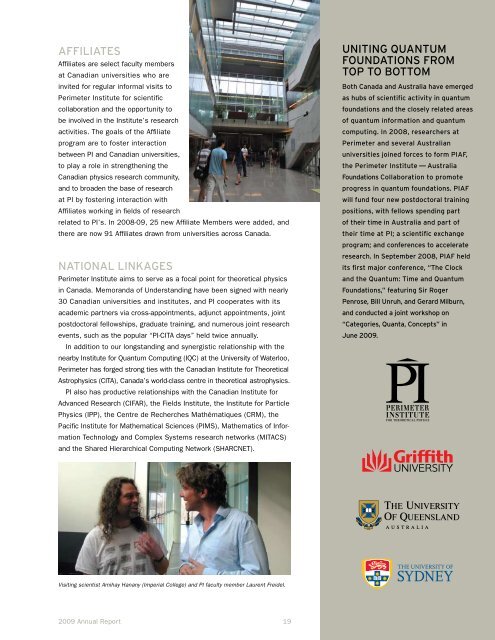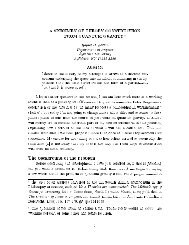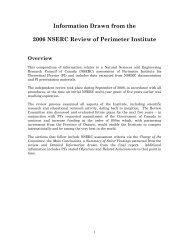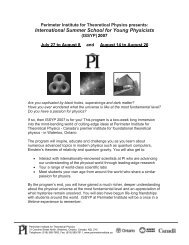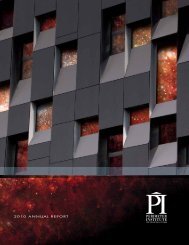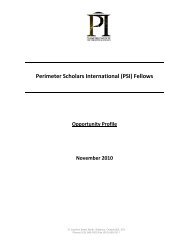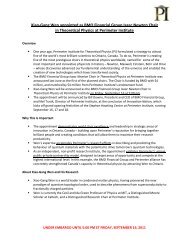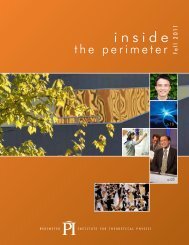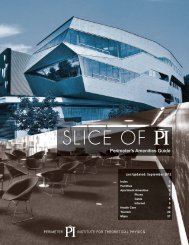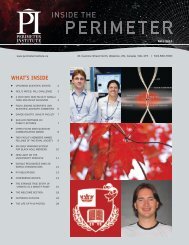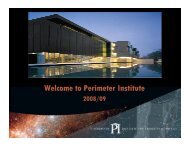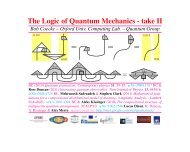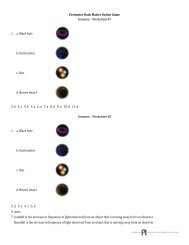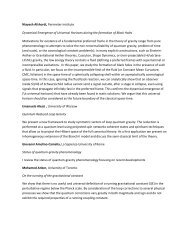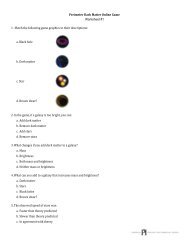2009 Annual Report - Perimeter Institute
2009 Annual Report - Perimeter Institute
2009 Annual Report - Perimeter Institute
Create successful ePaper yourself
Turn your PDF publications into a flip-book with our unique Google optimized e-Paper software.
Affiliates<br />
Affiliates are select faculty members<br />
at Canadian universities who are<br />
invited for regular informal visits to<br />
<strong>Perimeter</strong> <strong>Institute</strong> for scientific<br />
collaboration and the opportunity to<br />
be involved in the <strong>Institute</strong>’s research<br />
activities. The goals of the Affiliate<br />
program are to foster interaction<br />
between PI and Canadian universities,<br />
to play a role in strengthening the<br />
Canadian physics research community,<br />
and to broaden the base of research<br />
at PI by fostering interaction with<br />
Affiliates working in fields of research<br />
related to PI’s. In 2008-09, 25 new Affiliate Members were added, and<br />
there are now 91 Affiliates drawn from universities across Canada.<br />
National linkages<br />
<strong>Perimeter</strong> <strong>Institute</strong> aims to serve as a focal point for theoretical physics<br />
in Canada. Memoranda of Understanding have been signed with nearly<br />
30 Canadian universities and institutes, and PI cooperates with its<br />
academic partners via cross-appointments, adjunct appointments, joint<br />
postdoctoral fellowships, graduate training, and numerous joint research<br />
events, such as the popular “PI-CITA days” held twice annually.<br />
In addition to our longstanding and synergistic relationship with the<br />
nearby <strong>Institute</strong> for Quantum Computing (IQC) at the University of Waterloo,<br />
<strong>Perimeter</strong> has forged strong ties with the Canadian <strong>Institute</strong> for Theoretical<br />
Astrophysics (CITA), Canada’s world-class centre in theoretical astrophysics.<br />
PI also has productive relationships with the Canadian <strong>Institute</strong> for<br />
Advanced Research (CIFAR), the Fields <strong>Institute</strong>, the <strong>Institute</strong> for Particle<br />
Physics (IPP), the Centre de Recherches Mathématiques (CRM), the<br />
Pacific <strong>Institute</strong> for Mathematical Sciences (PIMS), Mathematics of Information<br />
Technology and Complex Systems research networks (MITACS)<br />
and the Shared Hierarchical Computing Network (SHARCNET).<br />
Uniting Quantum<br />
Foundations from<br />
Top to Bottom<br />
Both Canada and Australia have emerged<br />
as hubs of scientific activity in quantum<br />
foundations and the closely related areas<br />
of quantum information and quantum<br />
computing. In 2008, researchers at<br />
<strong>Perimeter</strong> and several Australian<br />
universities joined forces to form PIAF,<br />
the <strong>Perimeter</strong> <strong>Institute</strong> — Australia<br />
Foundations Collaboration to promote<br />
progress in quantum foundations. PIAF<br />
will fund four new postdoctoral training<br />
positions, with fellows spending part<br />
of their time in Australia and part of<br />
their time at PI; a scientific exchange<br />
program; and conferences to accelerate<br />
research. In September 2008, PIAF held<br />
its first major conference, “The Clock<br />
and the Quantum: Time and Quantum<br />
Foundations,” featuring Sir Roger<br />
Penrose, Bill Unruh, and Gerard Milburn,<br />
and conducted a joint workshop on<br />
“Categories, Quanta, Concepts” in<br />
June <strong>2009</strong>.<br />
Visiting scientist Amihay Hanany (Imperial College) and PI faculty member Laurent Freidel.<br />
<strong>2009</strong> <strong>Annual</strong> <strong>Report</strong> 19


